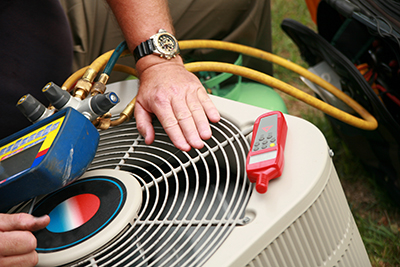If you’re considering a new air conditioner for your home, you have several options. The most traditional choice is a central air conditioner, while newer alternatives include heat pumps and ductless mini-splits. Below, we will compare central air conditioners and heat pumps to help you make a more informed decision about which option is best for your home.
Central Air Conditioning
Central air conditioners use ductwork to deliver cool air throughout your home. The blower compartment pulls air from your rooms and passes it over an evaporator coil within the indoor air handler unit. As the warm air passes over the coil, heat is naturally extracted by the refrigerant inside.
This heat is then pumped outside to the condenser unit via the compressor pump. Once outside, the low-pressure air passes over the condenser coil and extracts heat from the refrigerant. The refrigerant is then circulated back into the indoor air handler unit to remove more heat from your home.
Heat Pumps
Heat pumps are categorized into two types: ducted heat pumps and ductless mini-splits. Ducted heat pumps function similarly to central air conditioners. They pull air in through your ductwork, extract heat, and redistribute it throughout your home. In contrast, ductless mini-splits do not use ductwork. Instead, they feature multiple indoor air handler units conveniently positioned throughout various rooms in your home, delivering treated air to each location.
The primary distinction between central air conditioning and heat pumps is that the latter also provides heating. Heat pumps serve as an all-year-round HVAC unit, eliminating the need for a separate heater. Central air conditioners can only cool the air, necessitating the purchase of an additional heater to warm your home during the cold winter months.
Air-Source vs. Geothermal Heat Pumps
Heat pumps are available in two different styles: air-source and ground-source (or geothermal). The main difference between the two is that air-source pumps transfer heat with the outside air, while geothermal pumps transfer heat from below the soil’s surface. Air-source heat pumps are the most common choice for the average homeowner because they are affordable and non-invasive to install.
Geothermal heat pumps require an extensive installation process, where tubing is installed multiple feet underground outside your home. Although these heat pumps are more costly, they do have a longer lifespan. One notable aspect of geothermal heat pumps is that they provide more efficient cooling during the summer months. Heat from the refrigerant can disperse more easily in colder soil than in hot outside air.
Essentially, a geothermal unit uses less energy to remove heat from your home compared to an air-source heat pump or a central air conditioner. While geothermal heat pumps offer better cooling efficiency, we will focus on air-source heat pumps for the remainder of this article, as they are the most feasible option for the majority of homeowners.
Air-Sourced Paired With a Ductless AC
Hybrid systems that combine a central air conditioner with ductless AC units offer great flexibility and comfort. As HVAC technicians, we recommend this setup for homes with hard-to-cool areas or additions that lack ductwork. The central AC manages most of the cooling, while the ductless unit targets specific rooms for personalized comfort.
Operating Efficiency
One necessary area for comparison between central air conditioners and heat pumps is operating efficiency. The greater the efficiency, the less energy your unit will use, leading to more energy savings throughout the summer. Both heat pumps and central air conditioners are available in a wide variety of efficiencies, depending on your budget. The efficiency rating for air conditioners is SEER2. A higher rating indicates better efficiency.
Ductless mini-split heat pumps offer higher operating efficiencies than central air conditioners. This is because they do not use ductwork, which is susceptible to conditioned air loss as ductwork develops gaps and leaks over time.
Upfront Cost
Cost is likely to be a significant concern for any homeowner purchasing a new HVAC unit. Generally, central air conditioners are cheaper than heat pumps, making them a cost-effective choice for homeowners who already have a functioning heater and only need air conditioning for their homes. However, keep in mind that heat pumps can provide both heating and cooling, essentially giving you two units in one. This option can be particularly advantageous if you want an air conditioner and your existing heater is nearing the end of its lifespan. Instead of purchasing two separate units, you can enjoy the convenience of having both functionalities combined in one unit.
Maintenance Requirements
Like any HVAC unit, both central air conditioners and heat pumps require regular maintenance to remain in good working condition. Central air conditioners need servicing every spring by one of our professional HVAC technicians. Heat pumps require maintenance twice a year: once in the spring for cooling and once in the fall for heating. Both types of units necessitate regular filter changes for efficient operation and should have any debris around their outdoor condenser units cleared away to ensure adequate airflow.
Tax Incentives
When purchasing a new HVAC system, you must meet certain requirements to qualify for a federal tax incentive under the Inflation Reduction Act of 2022. Units that qualify are eligible to receive a tax credit equal to 30% of the cost of the new system, including installation, up to a maximum set amount.
To be eligible for these tax incentives, central air conditioners must have a SEER2 rating of 16 or higher and must be ENERGY STAR certified. Air-source heat pumps must have a SEER2 rating of 15.2 or higher and also be ENERGY STAR certified. Homeowners can claim a credit of up to $600 for central air conditioners and up to $2,000 for air-source heat pumps. It is important to note that this is a credit for federal income taxes owed, and you will not receive a refund check for the credit amount.
Making Your Ultimate Decision
Deciding whether a heat pump is better than a central air conditioner depends on your preferences. You’ll need to consider your home’s existing infrastructure, HVAC units, and your budget when deciding if a heat pump is the right choice for you.
If you are looking to purchase your first air conditioner and your home doesn’t have ductwork, it’s typically most cost-effective to buy a ductless mini-split heat pump. Paying to have ductwork installed in your home after it has already been constructed is extremely expensive and invasive.
If you already have ductwork in your home, central air conditioning is the most affordable option. If you have a heater that works well and has many years ahead of it, purchasing a central air conditioner can be ideal. However, if your existing heating system is nearing the end of its lifespan or you are considering upgrading to a more efficient heating system soon, you may want to consider purchasing a heat pump.
Expert HVAC Installation Service
Bernard Heating & Cooling offers expert HVAC installation services to the Akron, OH, community. Our knowledgeable technicians can also assist you with all your HVAC replacement, repair, and maintenance needs. Simply give us a call today to schedule your next service appointment.




